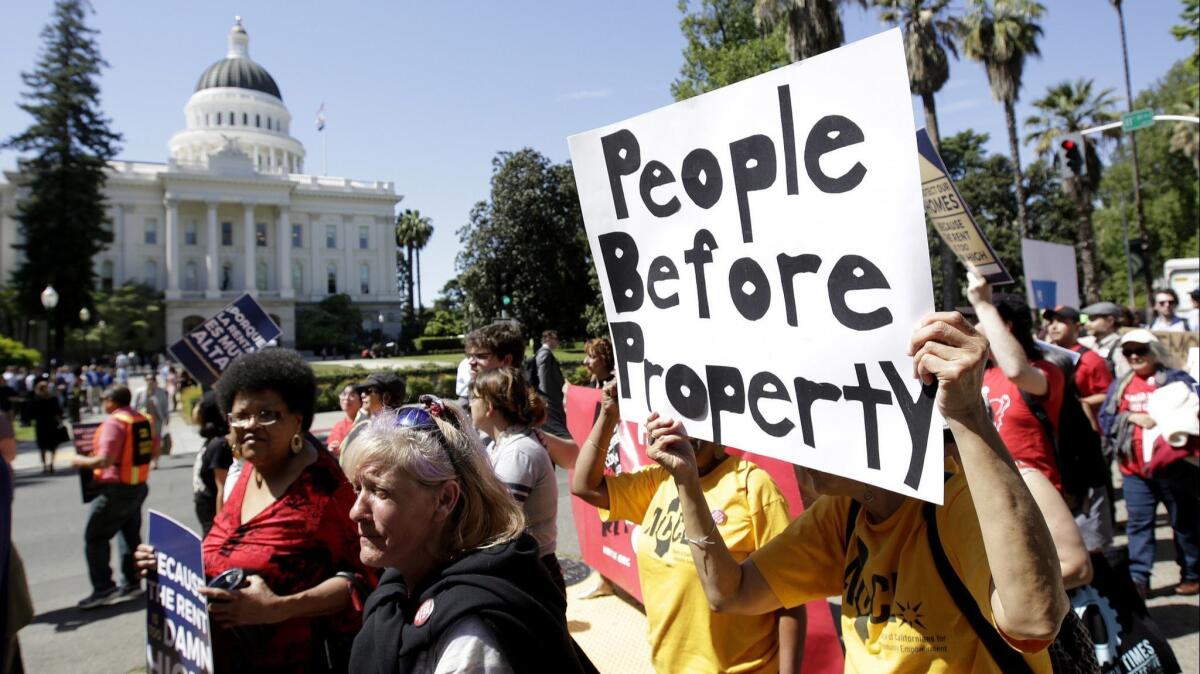Column: As major reform of California’s initiative process nears its anniversary, the record is mixed

- Share via
Ballot initiatives, the voters’ power to write laws on election day, are considered by many Californians to be a political birthright. But they have a love-hate relationship with propositions, which four years ago led to an overhaul that promised big improvements.
“We’re taking an important step to modernize and strengthen direct democracy,” said Gov. Jerry Brown as he signed the ballot-reform law that made three significant changes in the process.
First, it added extra time to qualify an initiative for the ballot, a potential boost to grassroots campaigns that have less money to gather voter signatures. Second, citizens were offered a chance to submit suggestions to make a proposed initiative better.
And perhaps most notably, the 2014 law allowed backers of an initiative to cancel the effort — even at the very last moment — if the Legislature agreed to take its own action on the issue at hand in the proposed initiative.
Radical plan to split California into three states earns spot on November ballot »
That was how lawmakers in Sacramento last week defused a first-in-the-nation ballot battle over consumer privacy. One week before November’s ballot propositions are set to be certified, legislators offered sweeping privacy legislation in exchange for the initiative’s backers standing down. (Huzzahs from the state Capitol notwithstanding, the bill still must clear the Legislature in just the next few days.)
It was similar to 2016, when labor unions leveraged signatures on an initiative that would have boosted California’s minimum wage to get Brown and lawmakers to agree to a deal to increase it.
But beyond these two examples, the initiative reform has done little to inspire compromise. Interest groups that spend millions of dollars collecting signatures still don’t have much incentive to make concessions at the state Capitol.
And the Legislature has done little to take advantage of a provision in the 2014 law that sought to encourage negotiations. The law requires legislators to be notified once an initiative’s backers collect 25% of the signatures needed to qualify so that legislative hearings can be quickly scheduled in search of agreement. But none of this year’s potential propositions received a hearing soon after they reached that threshold. Most cleared the 25% threshold in February, an achievement met with silence from the Legislature.
On primary day, Los Angeles voters picked different candidates for the same job »
A recent study by UC Davis’ California Civic Engagement Project found seven proposed initiatives, all of which hit the 25% signature mark, never received any hearing in the 2016 election cycle. All others did. The researchers concluded, based on interviews with legislative staffers, it was “presumably because they were not expected to qualify for the ballot.” The prediction proved true. But that kind of subjective vetting — this initiative is serious, that one isn’t — suggests the Legislature doesn’t see much value in these public hearings.
Nor have the backers of initiatives been getting much feedback from the public comments that can now be made on proposals in the early stages of the process. The study found more than 52% of the commenters simply wanted to argue the pluses or minuses of the initiatives. Only 13.6% of comments actually offered suggestions.
Hiram Johnson, the governor who championed the state’s initiative process in 1911, said he did so because he believed “not only in the right of the people to govern, but in their ability to govern.” The recent reforms were supposed to improve on that style of governing by creating more chances for dialogue and fostering more give and take. So far, few players involved in the high-stakes world of California politics seem to see much value in it.
Follow @johnmyers on Twitter, sign up for our daily Essential Politics newsletter and listen to the weekly California Politics Podcast
More to Read
Get the L.A. Times Politics newsletter
Deeply reported insights into legislation, politics and policy from Sacramento, Washington and beyond. In your inbox twice per week.
You may occasionally receive promotional content from the Los Angeles Times.











